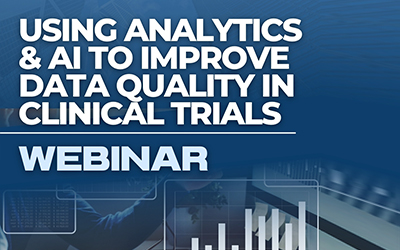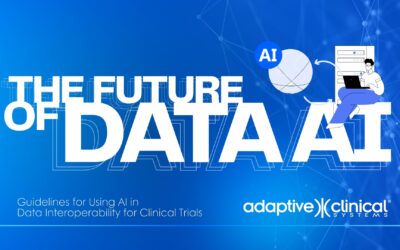AI & Interoperability
in Clinical Trials:
6
Strategic Insights You Can’t Afford to Miss

AI is dominating the conversation in life sciences — and for good reason. Used well, it can accelerate clinical trial execution, reduce manual workload, and surface insights that drive smarter decisions.
But here’s what most overlooked: AI is only as good as the data it relies on.
In our recent Adaptive Clinical webinar, “The Future of Data: Guidelines for Using AI in Data Interoperability for Clinical Trials,” industry experts Sina Adibi (CEO) and Eftim Pop-Lazarov (Chief AI Officer) broke down what it really takes to prepare your trials — and your infrastructure — for the AI era.
Below are six key takeaways for clinical, data, and IT leaders looking to move from theory to action — as shared by Sina Adibi, CEO of Adaptive Clinical Systems, and Eftim Pop-Lazarov, Chief AI Officer.
1. AI Depends on Data Quality — Not Just Data Volume
“AI doesn’t solve poor data hygiene. It exposes it.”
AI isn’t useful without clean, harmonized, and structured data inputs. Eftim made it clear: before implementing AI, organizations need to address core data quality and alignment issues.
Unreliable source data can derail even the most sophisticated models — leading to false positives, skewed analysis, or compliance concerns.
What to do:
- Eliminate manual handoffs between platforms
- Harmonize data formats early
- Use validation tools that ensure traceability and audit readiness


2. Disconnected Systems Are Slowing Trial Execution
Manual data entry, system reconfiguration, and file-based handoffs still dominate many trial workflows. The result?
- Delays during study startup and closeout
- Redundant effort across sponsor and CRO teams
- Higher risk of errors and protocol deviations
Real-time data unification across systems — not just integration — is now essential. Systems need to share data instantly in real time, not just at intervals or via custom exports.
Solution:
Adaptive Clinical’s eClinical Bus® connects EDC, EMR, CTMS, lab, imaging, and ePRO systems with a secure, validated data pipeline that eliminates data silos and enables continuous access.
3. The FDA Has Issued a 7-Step Framework for AI Use
AI isn’t uncharted territory anymore. The FDA’s guidance on Electronic Source Data in Clinical Investigations and recent frameworks around AI in drug development outline exactly what’s expected.
“Sponsors must define the question of interest, clarify the context of use, select appropriate models, and most critically — ensure all outputs are documented, validated, and auditable.”
This applies to both regulated AI applications and supporting tools used in operational contexts.
Your takeaway:
Make sure your data architecture supports compliance by design — including CFR Part 11, HIPAA (45 CFR Part 164), and GxP standards.


4. Human Oversight Is Still Essential
While AI can automate pattern recognition, data mapping, and predictive modeling, it doesn’t replace expert oversight.
“AI hallucinations” — where tools produce statistically sound but factually incorrect outputs — remain a risk, especially when working with real-world evidence or observational data.
To mitigate:
Keep humans in the loop for high-impact decisions Use tools that allow for manual rule layering and intervention Validate outputs continuously, not just during development
5. Interoperability Is By Design — Not an Add-On
AI initiatives often fail due to misaligned or siloed infrastructure. Without seamless data interchange across platforms, AI can’t access the right data, and teams waste time formatting, cleaning, or reconciling inputs manually.
True interoperability means data flows in real time, remains compliant, and supports every phase of the trial.
“Selecting best-in-breed tools and point solutions are recommended best practices, but only when they are “plugged in” with an interoperability backbone.”
Adaptive’s platform is purpose-built to ensure:
- No-code data connections between core systems
- A user-friendly mapping wizard with a robust rules engine for clinical data transformation
- Bidirectional, validated data pipelines that are monitored 24/7
- Complete audit trails and automated logging


6. Organizational Readiness Is the Real Bottleneck
Even with the right tools, AI adoption fails without the proper buy-in from all parties within an organization.
What gets in the way? Lack of clarity, insufficient training, and resistance to change.
“AI isn’t just a technology project — it’s a change management initiative.”
How to get ahead:
Train clinical and data teams early Set realistic expectations on timelines and capabilities Invest in a platform that aligns with your team’s workflow, not just your vendor’s pitch deck
Final Thoughts
AI in clinical trials is here now — it’s not a future promise. But it’s not enough to buy a model or bolt on a dashboard.
If you want AI to work, you need clean, interoperable, and validated data — from source to submission.
Whether you’re running complex global trials or preparing to scale your data infrastructure, Adaptive Clinical helps bridge the gap between today’s data silos and tomorrow’s AI-powered clinical operations.
Want the full webinar replay?
Access it here or connect with our team to see how Adaptive Clinical
can support your AI and interoperability roadmap.
Ask for a demonstration today.
Blog Posts & Resources
Using Analytics and AI to Improve Data Quality in Clinical Trials
Using Analytics and AI to Improve Data Quality in Clinical Trials. This webinar was held on Tuesday, July 9. A summary of the Q&A and Audience...
The Future of Data
THE FUTUREOF DATAGuidelines for Using AI in Data Interoperability for Clinical TrialsBy Eftim Pop-Lazarov, CTO and Chief AI Product Officer,...
Adaptive Clinical eBook Future of Data AI
Partners Adaptive Clinical shares resources to deliver unmatched solutions to our clients. Experience True Interoperability Through our...


